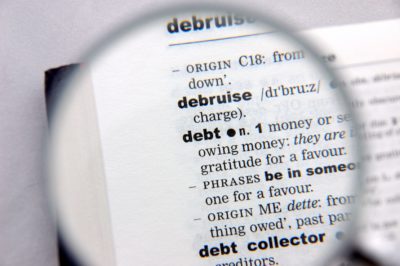 One of the best days of my life was the day that we, the family, were finally out of debt. We still have the mortgage, but that doesn’t really count as a debt — it’s more like an investment. It happened about three months ago, but now I feel that it is safe to talk about it because there is no sign of us going back into debt.
One of the best days of my life was the day that we, the family, were finally out of debt. We still have the mortgage, but that doesn’t really count as a debt — it’s more like an investment. It happened about three months ago, but now I feel that it is safe to talk about it because there is no sign of us going back into debt.
I can’t communicate how it felt, but it is up there with having babies and falling in love. After being in debt to the tune of around £10,000 for nearly 10 years, and almost always living on my overdraft for years before that, it is a new experience for me. It is like my life has suddenly begun again.
When you are heavily in debt, it colours everything you do. It is like being shackled, or having a millstone around your neck — everything you do has a bearing on your debts, either increasing them or reducing them. It doesn’t help to motivate you to do new things or achieve new heights when you have the negative goal of reducing your debts, or at least not letting the debt get any bigger. I felt that before I could do anything else financially, I had to get rid of the debt first; if you skip that step, debt will always be a part of your life. When the debt has gone, all the goals become positive. You can build the extension, go on holiday, move house, whatever, without having the debt to get out of the way first.
So how did we do it? First we drew up a list of debts and assets, and worked out our equity (ie, what we were worth after debts and savings (hahaha) were taken into account). I drew up a budget in a spreadsheet and worked out how much was left after all the necessaries had been paid for each month. That figure was then added up until it reached the amount of the debt. I calculated that it would take 12 months to eradicate the debt, so we had a target, which was the end of August 2006. That was a good motivator in itself — it could be done and it would only take a year. The whole family joined in and we found ways to reduce our spending to give us an even better chance. It worked perfectly, except it took a couple of months longer.
We paid off between £800 and £1000 each month. I had half a dozen 0% credit cards, and I swapped money around all the time to avoid paying interest. I was quite successful at that for a few years, but it was a constant worry, keeping track of all those cards, their payment dates, remembering the end date of the 0% promotional periods, applying for new cards, closing old accounts… Now I have closed all the credit card accounts except for one that I use for everyday spending – it pays a “reward” and I pay it off completely every month. If I am ever tempted to use it for a purchase that I can’t afford to clear at the end of the month, I will close that one as well.
And the icing on the cake is that we have decided to continue finding ways to reduce our spending, and we now have £800 left over every month which is no longer needed to pay off our debts. It is like having a massive pay rise. Some of it we are using to make overpayments on our mortgage, but I’m not sure if that is the best way to use the money.
https://waterfallmagazine.com
An interesting discussion is worth comment. I do believe that you should publish more about this issue,
it might not be a taboo matter but generally folks don’t talk about these
topics. To the next! All the best!!